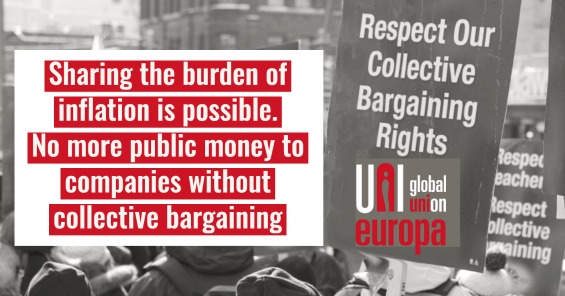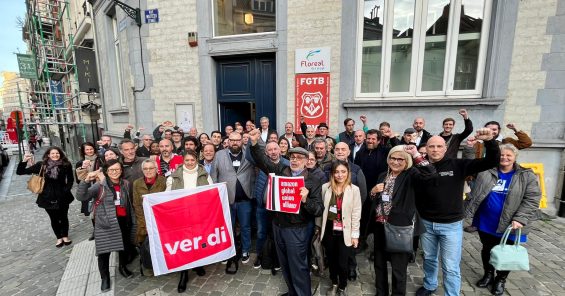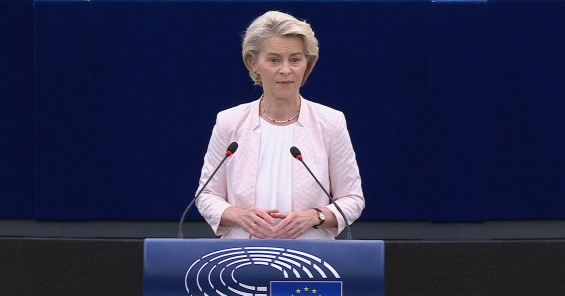Achieving wage justice in Europe
13.10.22
Making public contracts for private firms conditional on collective agreements can help stem the falling labour share.

Across Europe, working people are facing the cost-of-living crisis. There is increasing institutional understanding that the answer to sharing the burden of the crisis lies in strengthening collective bargaining. Now is the time for action.
Strengthening collective bargaining is key to ensuring a fair distribution of the inflation shock between workers and employers. In the longer term, a stronger voice for workers and more robust competition between employers would ensure a re-balancing of bargaining power.
These are the words of the Organisation for Economic Co-operation and Development in its recently-published Employment Outlook 2022. Indeed, the feeding frenzy we are witnessing on the part of capital, at a time when working people are being asked to tighten their belts, is not only morally offensive but also economically unsound. In what has come to be called ‘greedflation’, dominant corporations are jacking up prices and so adding to inflation while redistributing record profits upwards, in dividends to shareholders and chief-exective remuneration, yet often simultaneously imposing real-term pay cuts on workers.
Relentless weakening
This is a symptom of a deeper problem—the crisis in workplace democracy. When workers have the tools to have a strong say at the workplace, they use them to demand a fair share. Over the past three decades we have seen a relentless weakening of workers’ ability to bargain collectively.
This crisis in workplace democracy is in turn driving a crisis in political democracy. Our research shows that as collective bargaining has been attacked, inequality has increased. The weakening of collective bargaining means that the avenues working people have to work together and determine the conditions of their working lives, are increasingly being shut down. This very tangible loss of control and agency over their own lives is driving a loss of trust in the system amongst working people. In desperation, many are seduced by the promise of iron-fisted order by the far right.
There are some encouraging signs that this realisation is hitting home for policy-makers. The European Union’s directive on minimum wages and collective bargaining expresses some of the ambition needed. Particularly important is the target set out for member states of 80 per cent collective-bargaining coverage .
The services sectors, which account for the bulk of employment in Europe, will need specific attention. This mass workforce suffers from relatively low collective-bargaining coverage and some of the most malicious anti-union tactics. Hugely powerful corporations such as Amazon are using their power to circumvent democracy at work, all the while reaping in public money. Workers alone cannot rebalance the situation and for problems of a European scale we need EU action.
Public procurement
The easiest way the EU can take action to strengthen collective bargaining is through public procurement. Public spending on goods and services from private companies accounts for a whopping 14 per cent of the union’s gross domestic product.
The EU’s own broken public-procurement rules are resulting in companies being incentivised to suppress collective bargaining. By putting lowest price above all other selection criteria, public bodies are rewarding those companies prepared to dodge negotiations and squeeze workers hardest.
Instead, the rules should put a floor of decency under every private sector worker under a publicly procured contract. They can do so through a simple but profound change: by only permitting companies in which workers have collective-bargaining agreements to gain access to public money, working people would regain the means they need to face the cost-of-living crisis.
Support for this solution is growing and both unions and members of the European Parliament are increasingly pushing for it. Public money—the money working people pay in taxes—should not be used to finance companies that undermine our jobs and the wellbeing of society.
Sharing the burden of inflation can only be achieved if there is a rebalancing of power. Stronger together is the EU’s slogan. It must turn those words into action by moving forward through collective bargaining.
You may also be interested in

UNI’s Global Amazon Alliance issues ‘Common Demands’ for an overheating planet
24.07.24
News
Open Letters

Von der Leyen’s public procurement reform must lift workers’ living standards
19.07.24
Press Release
Meetings & Events
2024
10
Sep
Protected: UNI Europa FATIMA Project – 3rd Steering Group Meeting – 10 September 2024
Commerce
ICT & Related Services
Property Services